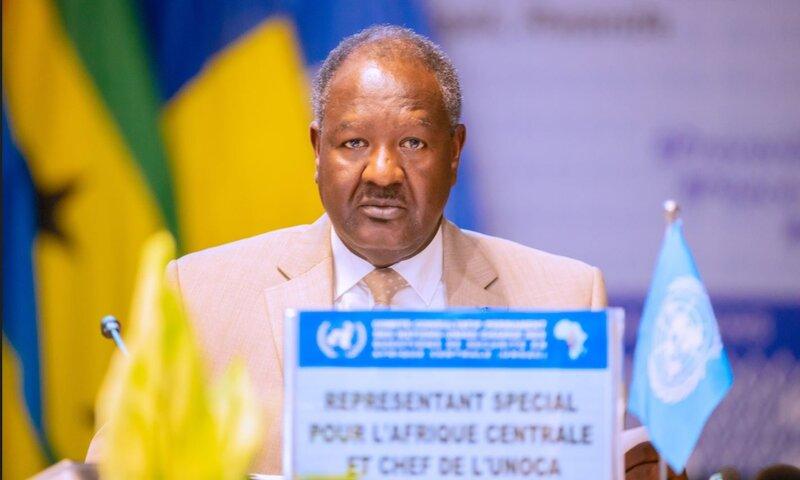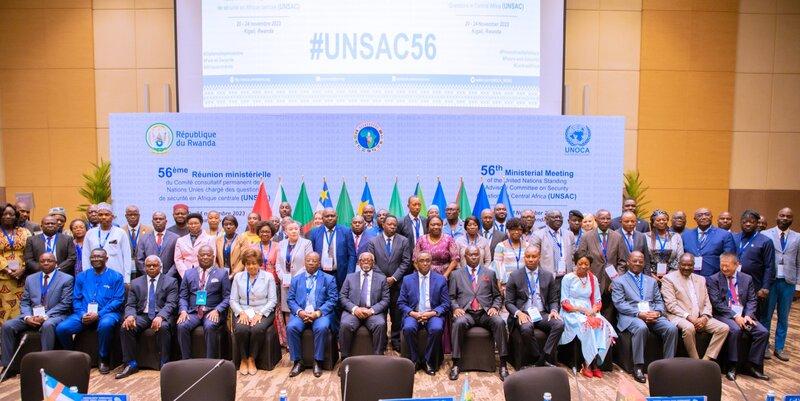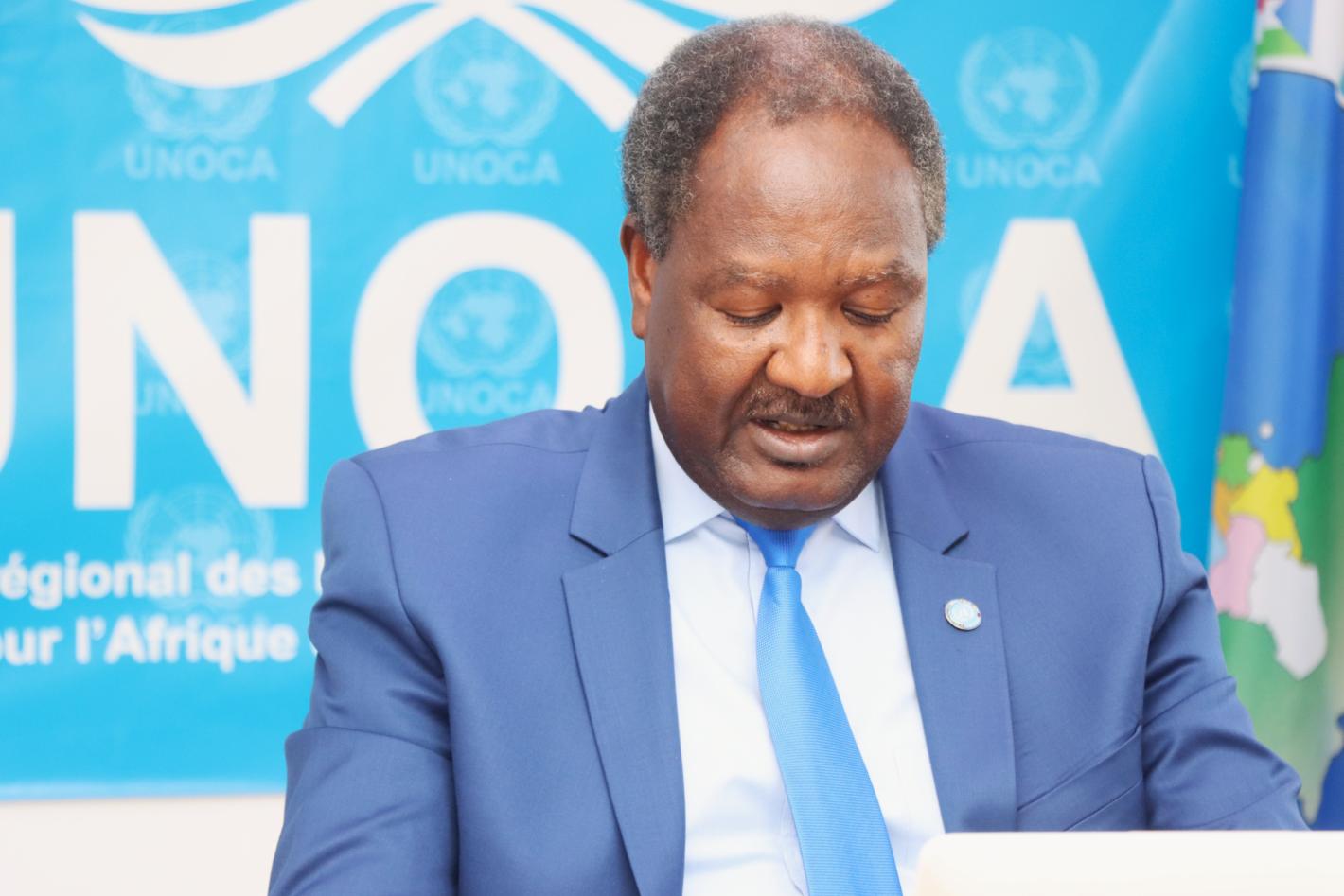The Member States of the United Nations Permanent Advisory Committee on Security Issues in Central Africa (UNSAC), meeting in Kigali from 20 to 24 November 2023 during their 56th session, decided to organize in the course of 2024 a regional conference on unconstitutional changes of government. The conference will allow to continue the reflections and experience-sharing that followed the presentation by the Cameroonian academic Wullson Mvomo Ela, invited as a consultant to talk about this phenomenon during the experts' session and the Ministerial closed meeting. The organization of the conference was entrusted to the United Nations Regional Office for Central Africa (UNOCA), which provides the UNSAC Secretariat. To guarantee the success of the conference, UNOCA will work in synergy with the new team leading the Committee, headed by Rwanda, as well as with all relevant institutions dealing with matters of political and democratic governance, among others.

The regional conference will include representatives of the civil society, researchers and other stakeholders with expertise from Central Africa and elsewhere who can contribute to the search for ways and means to effectively deal with non-constitutional changes. The “Kigali Declaration on the prevention and fight against unconstitutional changes in Central Africa” adopted by the Ministers of Foreign Affairs and Heads of delegation expresses the commitment of States to include this issue among the priorities of the sub-region. In his speech at the opening of the Ministerial session on 24 November, the Special Representative of the UN Secretary-General for Central Africa and Head of UNOCA, Abdou Abarry, welcomed their initiative to address, for first time, this crucial subject. Concerned by the resurgence of coups d'état observed recently in Africa in general, he believes that it is “imperative to reassess the prevention mechanisms that have shown their limits.”
Children in times of conflict
The regional conference on non-constitutional changes of government announced for 2024 is therefore of great importance. Of similar significance is the conference related to the situation of children in conflicts and the preventive measures – also decided by the Committee. This decision is a result of an overview presented by the Special Representative of the UN Secretary-General for Children and Armed Conflict, Virginia Gamba, who highlighted the challenges and prospects in this area. She took this opportunity not only to present her mandate but also to detail the six serious violations against children: murder or mutilation, kidnapping, recruitment or use of children in armed forces or groups, rape and other serious acts of sexual violence, attacks on schools and hospitals, and the denial of humanitarian access to and for children.
This last aspect is undoubtedly one of the points that will be addressed during the high-level regional conference on the humanitarian situation in Central Africa, scheduled for early 2024 in Malabo, Equatorial Guinea. The Committee welcomed this project on which UNOCA is working in close collaboration with ECCAS and the regional offices of the UN agencies concerned (UNHCR, OCHA, IOM). The “Kigali Declaration on the humanitarian situation in Central Africa” underlines the need for such a forum in a context marked by “the worsening of the humanitarian situation in the sub-region, resulting from conflicts and the consequences of climate and ecological emergencies.” This platform will indeed promote discussions that will contribute to the development of joint strategies to respond efficiently to humanitarian crises in the sub-region. Similarly, it will provide an opportunity to share good practices and lessons learned, with a view to developing a regional humanitarian policy.
A future in which peace, stability and democracy reign
Overall, the 56th UNSAC Ministerial session was considered very fruitful by the participants. In his closing speech, the Rwandan Minister of Foreign Affairs and International Cooperation, Vincent Biruta, expressed his gratitude to those present “for their commitment, their fruitful cooperation and their constructive spirit” throughout the meeting. “Together, we aim for a future in which peace, stability and democracy reign in Central Africa,” he concluded. His country will hold the rotating presidency of the Committee until the 57th meeting scheduled for May 2024 in Luanda, Angola (First Vice-Presidency). The Bureau also includes the Central African Republic (Second Vice-Presidency) and Chad (Rapporteur).

Apart from representatives of UNSAC Member States (Angola, Burundi, Cameroon, the Central African Republic (CAR), Chad, Congo, the Democratic Republic of Congo (DRC), Equatorial Guinea, Gabon, Rwanda, and Sao Tome and Principe), several regional and international organizations have participated in the 56th meeting of this body created in 1992, including UN entities and ECCAS, represented by the Commissioner for Political Affairs, Peace and Security, Mangaral Bante. The Coalition for Youth, Peace and Security in Central Africa (CJPAC) obtained observer status during the Kigali session. An approach to “guarantee the inclusion of youth perspectives in UNSAC discussions.”





